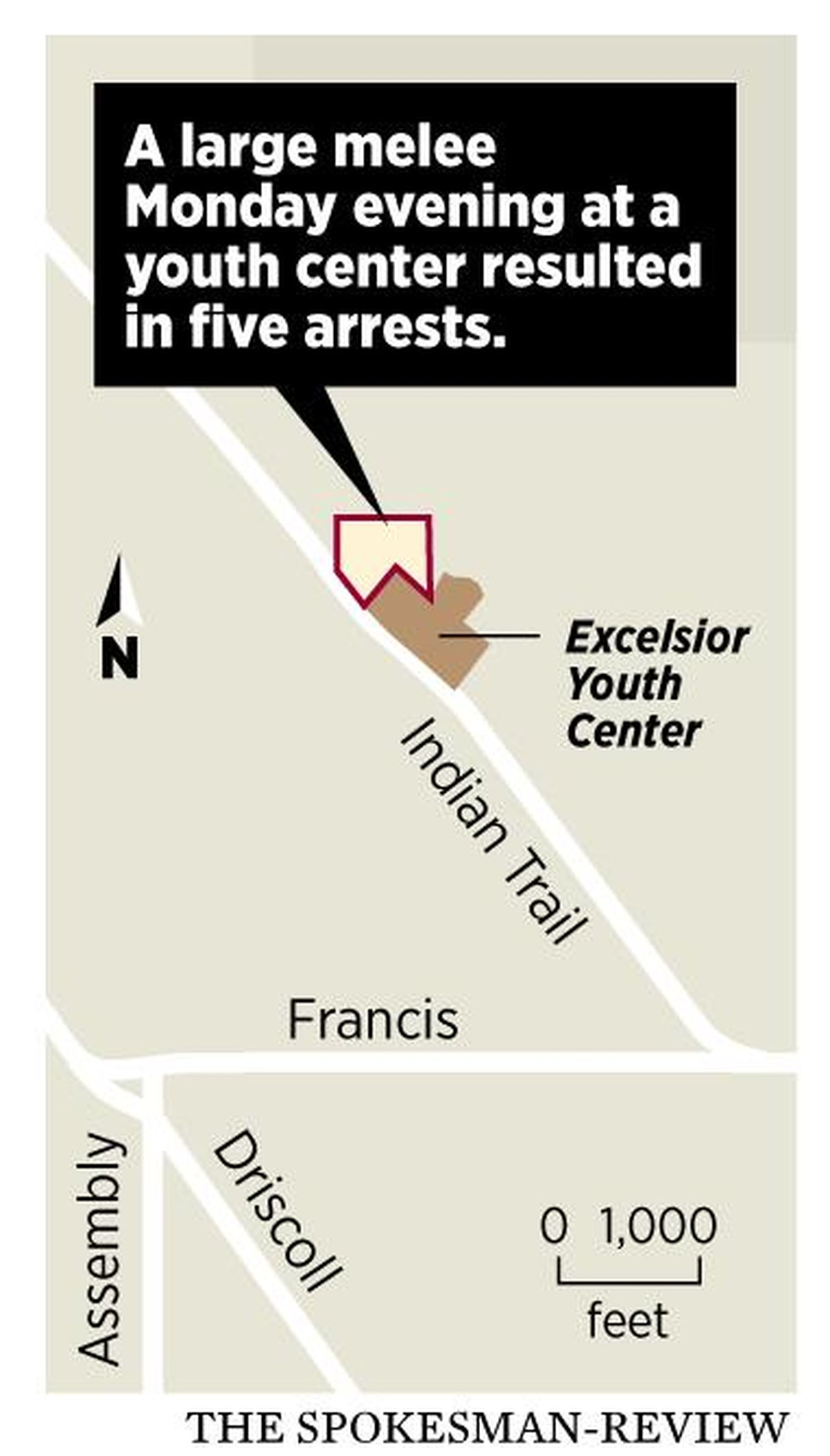5 arrested after officer, 7 staff members assaulted in melee at Excelsior Youth Center in Spokane

When neighbors Kelly Busse and Mark Anderson heard there was a melee Monday night at the Excelsior Youth Center, they weren’t surprised.
“There’s not much about Excelsior we don’t hear about,” said Busse, a retired Spokane police officer of 25 years. He said this month alone, he and other neighbors have heard about a break-in at a local convenience store carried out by two of Excelsior’s clients and have seen a handful of runaways walking down the street.
But this particular incident was different, he said. About 8 p.m. Monday, police were called to the facility for a report of a fight. When they arrived, they found about 15 people fighting among 50 gathered in the gym and the fire alarm blaring, according to a police news release.
The teens in the crowd apparently were hostile to police and interfered with officers as they attempted to break up the fights. They assaulted seven staff members and a police officer, and two other officers reported suffering minor injuries while making arrests, police said.
Altogether, five of the youths were arrested and accused of multiple crimes, including third-degree assault of an officer and rioting. About a dozen officers arrived at the facility to control the crowd and end the fighting.
“Being neighbors, I’m not surprised,” Anderson said.
He and Busse are vocal critics of the youth center, which was deemed “the largest single consumer of law enforcement resources for the Spokane Police Department” in 2014 by then-City Attorney Nancy Isserlis.
Each month, it draws roughly 110 calls for service, surpassing the next highest – NorthTown Mall – by about 2,000 calls for the 24-month period that ended in December.
Busse, who remembers getting called to the center “quite often” while he was a patrol officer, is sympathetic to the center, the largest youth facility in Eastern Washington.
But he has maintained for years that the problems the center faces are avoidable – a viewpoint he garnered from his time spent in group homes growing up.
“They have a level of chaos they have to control all of the time,” he said of Excelsior. “But I’m not really comfortable with any part of their program.”
From his time interacting with staff in the past, he said they’re “badly trained and poorly understood what they needed to do.”
“A lot of the time they would just physically restrain kids, and put them in timeout,” he said. “Then they would turn around and try to file charges on the kids for assault. It was a vicious cycle.”
Excelsior CEO Andrew Hill has said in the past that controlling the center’s clients isn’t as simple as most people think. Because they are juveniles, the center can’t just lock them up – it’s not a prison or a hospital. Hill did not return multiple calls seeking comment Tuesday.
But Busse, who spent time in group homes while growing up, including the Hutton Settlement, is aware they can’t simply lock their doors. He said it should be possible to at least provide some level of added security so kids don’t run away.
“I would beef up the external perimeter, and would make it so running away is more difficult,” he said. “Right now, all they have to do is walk out the back door, because nobody can or will stop them. Then they become a police problem because they’re a runaway.”
Anderson agreed, citing a May 1 incident at his house in which a kid showed up on his doorstep in the pouring rain late at night.
“It was cold and wet and he was lost,” he said.
Anderson called the center to report he had found a runaway, then gave the kid directions on how to get back. Forty minutes later, he said, he called back and asked if the juvenile made it back OK.
“All they could tell me is they could neither confirm nor deny the boy in question made it back,” he said. “They don’t even want to cooperate to try and be helpful.”
Anderson and Busse also are active in fighting a new 22,000-square-foot, 16-bed youth transition facility that Excelsior will soon build on its campus. The two recently testified in a hearing examiner meeting, which granted approval for Excelsior to proceed with the project.
In his decision, Spokane Hearing Examiner Brian McGinn made note of the residents’ concerns, but he concluded there was a lack of evidence linking Excelsior’s clients to crimes in the area, noting that even if they were behind them, it wasn’t the fault of the center.
“They can’t even handle what they have now, and they want to add more?” Anderson said. “At this point, I don’t even know what else can be done. If there’s something more we could do or say, we would say it.”